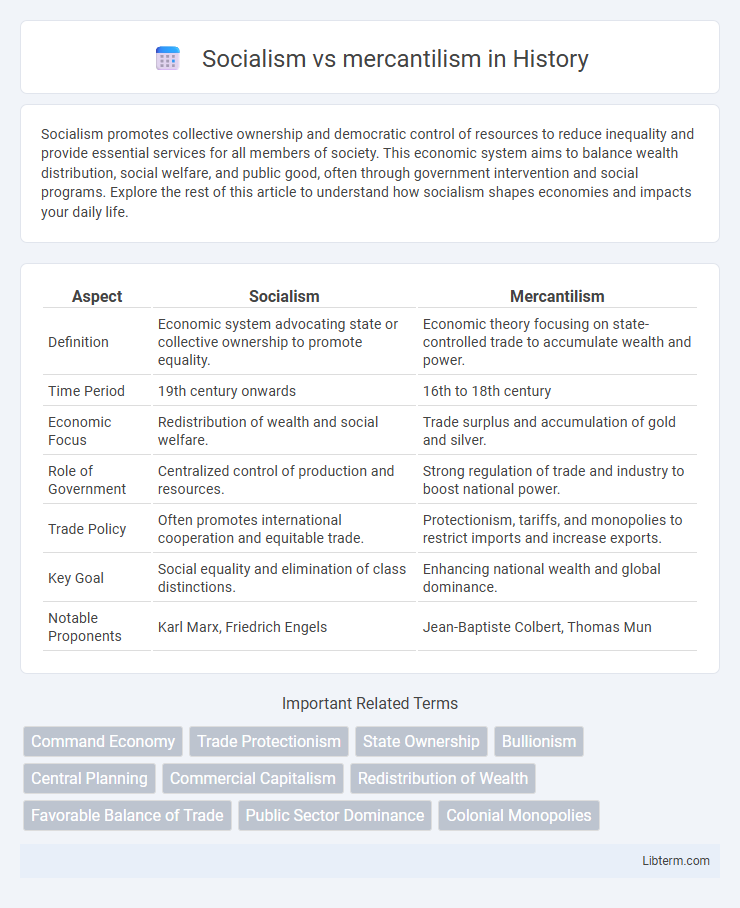Socialism promotes collective ownership and democratic control of resources to reduce inequality and provide essential services for all members of society. This economic system aims to balance wealth distribution, social welfare, and public good, often through government intervention and social programs. Explore the rest of this article to understand how socialism shapes economies and impacts your daily life.
Table of Comparison
| Aspect | Socialism | Mercantilism |
|---|---|---|
| Definition | Economic system advocating state or collective ownership to promote equality. | Economic theory focusing on state-controlled trade to accumulate wealth and power. |
| Time Period | 19th century onwards | 16th to 18th century |
| Economic Focus | Redistribution of wealth and social welfare. | Trade surplus and accumulation of gold and silver. |
| Role of Government | Centralized control of production and resources. | Strong regulation of trade and industry to boost national power. |
| Trade Policy | Often promotes international cooperation and equitable trade. | Protectionism, tariffs, and monopolies to restrict imports and increase exports. |
| Key Goal | Social equality and elimination of class distinctions. | Enhancing national wealth and global dominance. |
| Notable Proponents | Karl Marx, Friedrich Engels | Jean-Baptiste Colbert, Thomas Mun |
Introduction to Socialism and Mercantilism
Socialism is an economic and political system advocating for collective or governmental ownership and administration of the means of production and distribution of goods, aiming to reduce inequality and provide social welfare. Mercantilism, dominant during the 16th to 18th centuries, emphasizes state control over economic activities, focusing on accumulating wealth through trade surpluses, strong regulation, and protectionist policies. Both systems prioritize state involvement but differ fundamentally in objectives: socialism seeks social equity, while mercantilism aims at national economic power.
Historical Origins of Socialism
Socialism originated in the early 19th century as a reaction to the inequalities produced by mercantilism and industrial capitalism, with thinkers like Karl Marx and Friedrich Engels critiquing the concentration of wealth and power under mercantilist policies. The mercantilist era, spanning the 16th to 18th centuries, emphasized state-controlled trade and accumulation of wealth to strengthen national power, which socialists argued exploited the working class. Socialism sought to replace mercantilist protectionism with collective ownership and equitable distribution of resources to address socioeconomic disparities.
Historical Origins of Mercantilism
Mercantilism, emerging in Europe during the 16th to 18th centuries, is rooted in the economic policies of emerging nation-states aiming to accumulate wealth through trade surpluses and colonial expansion. This system prioritized state control over commerce, emphasizing the accumulation of gold and silver as national wealth, contrasting with socialism's later focus on collective ownership and wealth distribution. The mercantilist framework laid the foundation for modern economic nationalism, influencing the development of global trade and imperial policies before the rise of capitalist and socialist ideologies.
Core Principles of Socialism
Socialism centers on collective ownership and the equitable distribution of resources, emphasizing social welfare and reducing economic inequalities through state intervention. It advocates for public control of production means to ensure wealth benefits the entire population rather than individual capitalists. This contrasts with mercantilism, which prioritizes national wealth accumulation through trade surplus and state regulation to strengthen the economy.
Fundamental Tenets of Mercantilism
Mercantilism centers on the accumulation of wealth through a positive trade balance, emphasizing government regulation to maximize exports and minimize imports. It advocates for state intervention in the economy to build national power by controlling resources, establishing colonies, and imposing tariffs. Unlike socialism's focus on collective ownership and wealth redistribution, mercantilism prioritizes national economic growth and the protection of domestic industries through commercial policies.
Economic Policies: Socialism vs Mercantilism
Socialism emphasizes government ownership or regulation of resources to achieve economic equality and social welfare, promoting wealth redistribution and public control over production. Mercantilism prioritizes state control of trade and accumulation of wealth through a positive balance of exports over imports, enforcing tariffs and monopolies to strengthen national power. Economic policies under socialism focus on equitable resource allocation, while mercantilism centers on protectionist measures to enhance national economic dominance.
Social Impact and Class Structure
Socialism promotes a more egalitarian social impact by advocating for wealth redistribution and collective ownership, which aims to reduce class disparities and empower working-class communities. Mercantilism reinforces rigid class structures through state-controlled trade policies that benefit the emerging merchant class and aristocracy, often exacerbating social inequality. The social impact of socialism centers on reducing poverty and enhancing social welfare, whereas mercantilism maintains established hierarchies and prioritizes national economic strength over social equity.
Government Role in Both Systems
Socialism features extensive government control over production and distribution, aiming to reduce inequality through wealth redistribution and public ownership of resources. Mercantilism emphasizes strong government regulation of the economy to enhance national wealth by controlling trade policies, tariffs, and colonial resources. In socialism, the state directs economic activities to promote social welfare, while in mercantilism, government intervention concentrates on maximizing exports and accumulating precious metals.
Modern Applications and Relevance
Modern socialism emphasizes wealth redistribution through social welfare programs, universal healthcare, and public ownership of key industries to reduce economic inequality. Mercantilism's principles appear in contemporary protectionist policies, such as tariffs and export incentives, aiming to strengthen national economies by prioritizing trade surpluses. Both systems influence current debates on globalization, economic sovereignty, and government intervention in markets.
Conclusion: Comparative Analysis
Socialism prioritizes equitable distribution of resources through collective ownership, aiming to reduce social inequalities and promote public welfare, while mercantilism emphasizes state control over trade and accumulation of wealth through protectionist policies to enhance national power. The two systems diverge fundamentally in economic objectives, with socialism focusing on social equity and mercantilism on economic nationalism and wealth accumulation. Understanding these differences highlights the broader ideological divide between collective social goals and competitive economic strategies.
Socialism Infographic

 libterm.com
libterm.com